Team blog – 2019-20 Code for Canada fellowship team working with PSPC's #NextGenTravel Program.
Don't wanna be here? Send us removal request.
Link
This week is our final week. Here’s a snapshot of our fellowship!
–Maddy, Product Manager
It’s hard to believe, but it’s our last week. It’s week 40.
As I realized how close we were coming to the end of the fellowship, I took a look back over the past ten months.
We’ve done a lot: countless hours of user interviews, talked with 50+ users, synthesized insights that led to key concept prototypes that have influenced the future of business travel within the federal government, and we spun up technical explorations that have opened conversations around how we can improve and build a more robust and flexible software ecosystem.
I’m extremely proud of what we’ve been able to accomplish.
Thank you to my team, Andrea and Mike. They’ve been incredible partners throughout this process.
Thank you to our government partners for bringing us on board, taking flight, and for their support along the way.
2 notes
·
View notes
Text
How we tried different agile practices until we landed on ones that worked for our team!
–Maddy, Product Manager
Introducing agile practices to a non-development team
Week 34 | February 10–14, 2020
Today, I wanted to share a little bit about my team’s journey of introducing agile rituals and practices to a non-development team. A couple weeks ago, we had a productive and meaningful team retrospective with our government partners. We were really moving in sync as a whole team.
I have spent the last seven, going on eight, years on various development and technical teams from small itty-bitty startups to large hardware corporations. The fellowship has been a new, interesting challenge for me personally. I have a technical background (engineer turned product manager), and for the first time, joined a team that wasn’t majority engineers.
So, it wasn’t without some bumps along the road to finally find a pattern of agile rituals that did work for us.
Keep reading
2 notes
·
View notes
Text
On prototyping a process/service, not only a product.
–Maddy, Product Manager
Week 33: Face what isn’t working (aka learn!)
Week 33 | February 3–7, 2020
Experimentation with Self-Service Booking
I’ve mentioned the experimental pilot we’re running a couple of times now.
Our goal is to “make it easier for travellers and travel support to book travel using the booking services of their choice, while still complying with Government of Canada travel directives.”
Our hypothesis is by allowing travellers and travel support to book their own travel, we can reduce errors, save time, and even save money, and hopefully public servants can feel empowered, with more flexibility and autonomy.
Keep reading
3 notes
·
View notes
Photo
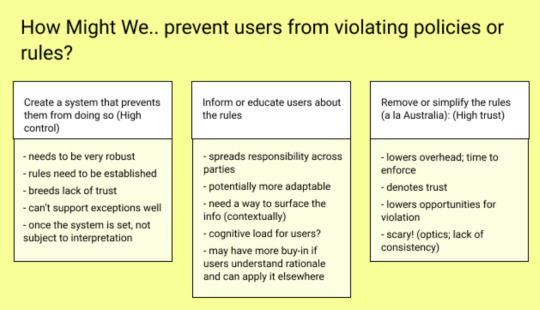
Going through some old slide decks and notes as we prepare to wrap up our fellowship! There’s a spectrum when designing a system: does it fall to the system designers or the users to minimize errors? Where do you value consistency vs flexibility?
Having a clear vision and set of values can make other design decisions fall into place.
2 notes
·
View notes
Text
We haven’t blogged in a while, so here’s a quick recap of weeks 30–32 to get you caught up!
–Maddy, Product Manager Fellow
Week 30, 31, 32
Week 30, 31, 32 | January 13–31
Whew, so, we’re behind on blogging. It’s been a busy few weeks around here.
Instead of sharing details week over week, I thought I’d give a high level recap/share the highlights.
Transition
Our fellowship ends March 27th. It feels too soon to be discussing off-boarding and handoff, but we want to be prepared. We need to ensure our partners are well supported after we depart – across documentation, skills, and knowledge sharing. We’re figuring out how we can support the team, and properly document and hand off our prototypes, service blueprints, and other work.
A lot of the heavy lifting is making sure the prototypes we have developed are framed correctly, and we identify an owner after we’re gone.
Self-Service Booking Experiments
With a small group of participants, we’re running an experiment where travellers are booking without a centralized tool. The past few weeks have allowed us to create clarity for the participants in what’s expected of them.
We’ve also had check-ins to stay updated, get their feedback, and learn about their experience trying to book without a centralized software tool. We’re digging into issues they might run into, like flight cancellations/changes (What happens if my flight gets cancelled? What if I’m travelling to a business meeting and the meeting gets cancelled?), payment (How will I pay for my flight, train, bus, etc.?), and “unhappy path” situations.
Retreat
We had the opportunity to come together with our fellowship cohort in mid-January. We reconnected, reflected, and discussed stories that we can tell when we look back on our fellowship.

Caption: A team that washes up together… does great work together?
Alt Caption: Man and two women stand beside each other facing a mirror. Man is wiping his hands with a paper towel, the two women are posing, one woman takes a picture into the mirror.
Service Blueprinting
Andrea has been deeply involved in the design of service blueprints, which will be a part of providing recommendations for the future GC travel experience. We’ve done many iterations of blueprints, and are digging deeper into new, specific areas – like getting approval.
Prototypes
Ongoing development, incorporating feedback from users and feature suggestions from stakeholders.
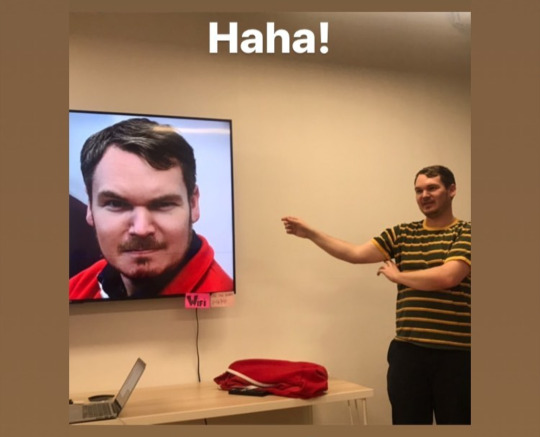
Caption: Mike on Mike
Alternate Caption: Man stands beside a television screen presenting a slide with a picture of himself with a concerned expression, eyebrows raised.
#CodeForCanada#Code4CA#WorkingInTheOpen#CivicTech#GovTech#BusinessTravel#ServiceBlueprint#Prototyping
1 note
·
View note
Text
Week 29: Improving Users, Not Products
Jan 6 - 10, 2020
This was the first week that everyone was back in the office after remote work over the holidays. We didn’t waste any time easing back into it, and kicked off a round of getting feedback from our pilot group right away.
This week we held 6 calls with travelers across Canada, from Vancouver, Edmonton, Winnipeg and Kanata, and talked to them about two separate concepts.
When we talk about travel, current travelers immediately start thinking of the current tools and processes they follow. But we’re not just here to re-skin the current tool, we’re here to imagine something different.
Keep reading
2 notes
·
View notes
Text
Week 26: Merry Week-Before-Christmas!
December 16 - 20, 2019
What a week to head into the holidays!
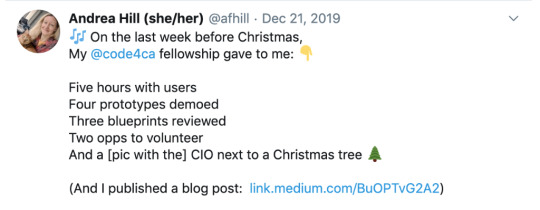
I think I summed it up pretty well with my tweet, but to give just a touch more detail-
Keep reading
1 note
·
View note
Text
Week 25: Node+JS Interactive 2019
Dec 9 - 13, 2019
This week has very much been a build week, starting to build the foundation for a new prototype around “No Booking Tool”. For Monday and Tuesday I kept my head down, coding and coding.

I was lucky enough to score a ticket to Node + JS Interactive in Montreal, so on Tuesday night I jumped on the train and headed up to Quebec to see what’s new in JavaScript this month.

Open JS Foundation provides a neutral home for open source JavaScript projects supported by companies as big as Google and Microsoft. This week they’re putting on a conference in Montreal, so it was time to get nerdy amongst other developers and learn some new things!
On Wednesday morning OpenJS Foundation presented some updates, including the use of Node.js in space (accompanied by some nervous laughter from the audience), new Node Certifications and the announcement that they’re taking on the excellent desktop app framework, Electron, which is the framework behind Slack and Visual Studio Code.
The highlight of the morning though was the conference’s first live coder and advocate for women in tech, Ellie Galloway. Ellie demonstrated Jewelbots’ codeable wearables, which were created to get kids interested in coding and STEM topics. I personally can’t wait to experiment with my MXChip from Microsoft!

I attended some great talks learning about efficient streams and worker threads by Liz Parody, as well as a talk by Microsoft on how to run my own dev box in the cloud with Visual Studio Code, which even allows you to share screens and pair program together!
A talk on UX by Maurice Hayward really drove home a lot of what I’ve learnt during the fellowship. He talked about accessibility, and how if we make software accessible, we’re making it better for everyone. With an audience of developers, he showed us that as developers, we’re making decisions that impact UX.
At this point it was time to take a break from the conference and connect with the rest of the fellows on our cohort wide call.
David Horvath from HackerOne talked about security vulnerabilities and gave some data-based insights on current security vulnerabilities. The OWASP Top 10 famously lists the top 10 security concerns in software, however David pointed out concerns vary greatly, depending on their discoverability and the skill of the hacker.
Next up I made my first VS Code extension, making a function that re-factored a JavaScript function by interacting with it using the Abstract String Tree, a way of manipulating the syntactic structure of code. These types of extensions are great for linting code as well as being able to detect when code is invalid before you even run it.
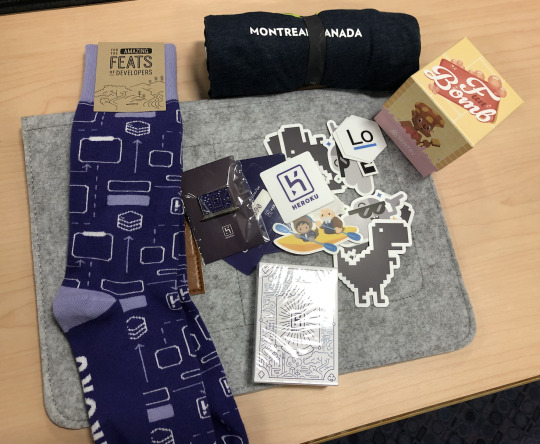
At development conferences, booth crawls are always a lot of fun (+ there’s always a lot of swag up for grabs!). Google, Microsoft and Heroku were all there to talk about their cloud services. Working with these platforms is one of those necessities of being a developer. I always enjoy talking to technical staff at these events and always come away with new knowledge that will make my life easier.
Thursday was mostly about the geekier topics, some of which I understand, some of which I’ll leave to the maintainers of Node.
Marian Villa, CEO of Pionerasdev spoke about how her not-for-profit organization helps Colombian women learn to code in a safe space. It was inspiring to see it has grown from something small, a few people getting together to code, to something that will impact peoples lives and careers.
A refresher on Electron by Felix Rieseberg from Slack was a highlight. For me it’s something I tried towards the beginning of my career as a dev, and at that time it was quite new, but Electron has matured and has gained quite a following. Unlocking the world of desktop apps for web developers, Electron allows us to build cross-platform desktop apps with Javascript, HTML and CSS. I’m looking forward to finding an application to try this one out!
Ayesha Mazumdar from Optimizely gave a great talk about scaling accessibility. She provided examples of common pitfalls with accessibility, many of which I’ve been guilty, and provided constructive ways to prevent the gotcha using component libraries.
Alessandro Segala introduced us to the world of the Inter-Planetary File System. No, it’s not just a concept, it really works! It’s a way to serve files and, as he demonstrated, static web apps on a distributed network.
Mixing cats and code seems to come naturally for programmers. Constanza Yáñez Calderón presented her solution to getting home late to upset cats. She made a cat feeder, based on node-cron running on a Raspberry Pi. It was great to see her project progress, and the mishaps she encountered with cron that gave her (very happy) cats new food every hour instead of every day!

As a developer, you tend to spend a lot of time in the command line. Ruy Adorno from npm showed us his favourite command line tricks to help workflows and add interactivity to the terminal, making things like switching git branches or selecting folders a lot easier. My favourite quote from Ruy was “The command line is an amazing user interface” - I agree!
Kadir Topal talked about the Top 10 Frustrations for designers and developers. #1 is having to support specific browsers (IE11 anyone?) and in the top five, we blame four of those things on browsers!
Then that was the end! Node + JS Interactive was over. Next time I’d love to see more front-end content, and with Electron now in the mix, I’m sure the next event in Austin in June 2020 will have a full-stack lineup of interesting talks.
1 note
·
View note
Text
Week 24: Organizing experimentation + brainstorming
Week 24 | December 2 – 6, 2019
Date of writing this blog | December 20, 2019
—
I’m a little behind on writing this. It’s been a busy few weeks here: lots of productive meetings, Andrea has been head’s down on design and service blueprints, Mike has been at a conference and building prototypes, I’ve been organizing a dedicated test group that we’re experimenting with and supporting Andrea in meeting with folks across finance, managers, travellers, and different organizations to further understand how travel and finance are related.
But… back to week 24!
—
Monday through Wednesday were largely organizational days for me: lots of emails and preparing for a kickoff meeting. Exploring opportunities to experiment with other organizations to put a couple ideas – for example, what would business travel look like without a centralized booking tool? – to the test.
We often hear that the regions feel left out since they’re away from the National Capital Region (NCR). We’re also interested in how the process of an organization that is based outside of the NCR might differ from one that is here, so we’re talking with a regional organization to experiment with them and do user research.
On Wednesday, we escaped from rooms with our government partners for a holiday celebration!

Source: https://www.facebook.com/EscapeManorOttawa/photos/a.980275122331391/984027048622865/?type=3&theater
On Thursday, Andrea led us through a really interesting activity. Since we’re exploring what decentralized booking for travellers looks like, we started by brainstorming the benefits of a centralized booking tool. Then we ideated around how we could provide those benefits without having a centralized booking tool.
Some of the benefits we brainstormed of a centralized booking tool are:
Reporting – collect and centralize data for insights and to negotiate with vendors
Simplicity – e.g. stored preferences and payment cards, aggregated options
Surfacing policy/rules and giving travellers flexibility in cancellation and rebooking
Directly ties into expenses
Based on that foundation, we ideated how we could solve for those in a world where booking is decentralized (i.e. where people can use the services of their choice, e.g. Google Flights, Kayak, Expedia):
*Disclaimer that these are just some of the ideas we had, and are just ideas!*
Offer a non-mandated booking option
Open APIs for profile information
Give travellers a recommended itinerary
A travel guidebook with resources that link out to policy/rules
One travel manager who has all the expertise and can book for the traveller
On Friday, we were back to talking with users! We chatted with a public servant at Transport Canada (TC) for which travel is a big part of their job. They presented some really interesting insights into travelling to remote locations and in and around the northern territories of Canada. For example, unpredictable weather is a huge factor. They can be stuck in a remote location for days until the weather passes.
—
Happy holidays & see you in the new decade!
– Maddy, Product Manager Fellow
1 note
·
View note
Text

Today we're at PSPC HQ chatting with Digital Services Branch execs. Talking prototyping & design sprints!
1 note
·
View note
Text
Week 23: Visualizing Information
Nov 25 - 29, 2019
As Maddy mentioned, over the past couple weeks we’ve had a half-dozen interviews with public servants, so this week we took the time to regroup and look for patterns and opportunities.
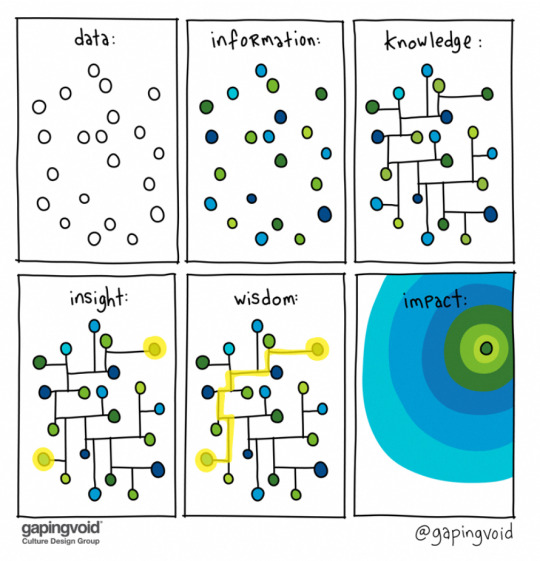
Image credit: @gapingvoid-blog
Keep reading
3 notes
·
View notes
Quote
A week on the road is three weeks of paperwork in the office.
A public servant (who is on the road often for their work)
1 note
·
View note
Video
youtube
Our team is talking about a world where travellers don’t have a centralized booking system. This was Mike’s response. (I don’t get it, but I appreciate his creativity...) -Andrea
0 notes
Text
Week 22: We’re talking with users again!
Week 22 | Monday November 18 – Friday November 22
It’s pretty surreal to think that we’re rounding out week 22 of 40 embedded with our partners. That’s 55%, whew!
We made serious headway this week:
Talked with 6 travellers and travel arrangers. Mostly focused in the NCR, but some in other provinces as well.
IF YOU’RE INTERESTED IN PARTICIPATING, SIGN UP HERE!
If you’re unable to access the GC Intranet at this time, please email me here, or DM me on Twitter here, and we can connect.
Made significant headway on organizing an upcoming pilot with a small test group, where we will be prototyping tools to test whether we can improve their travel experience if they had flexibility in where they booked their travel.
Opened the conversation with our comms team about how we can share our prototypes more widely.
Wrapped up the first version of a fully interactive, functional prototype that helps you put together a travel estimate.
Started getting feedback on the prototype to learn whether it satisfies user needs. (Does it help reduce the time to build an estimate? Does it reduce errors in the estimate?)
Got a local Postgres database set up to consolidate some large Excel files, and allow me to run SQL queries (my data bread and butter) on the historic travel data we have.
Developed a first draft of a current-state service blueprint.

Caption: Mike and Andrea discussing the travel estimate prototype.
Alternative caption: A woman with blonde hair and blue jacket stands holding coffee beside man with red jacket sitting in a chair. They are looking at a laptop computer hooked up to a monitor. They are in an office cubicle.
This week was heavily focused on the building and testing portions of our newly minted team slogan:
Learn & Build & Test & Repeat.
As a product manager, I’m stoked that we’re prototyping, seeking data to define success/failure of the prototypes, and getting feedback from real end users which is leading to… what is shaping up as a product backlog!
Another big turning point this week was changing our working style slightly. We’re shifting back to sprints – but one week sprints! This will allow us to have really short, tight feedback loops from prototyping to getting feedback on it, and shifting direction based on the feedback very quickly before we invest any more time in a bad idea.
–Maddy, Product Manager
2 notes
·
View notes
Text
Week 21: Back to the office
Week 21 | Monday November 11 – Friday November 15
After a solid couple of weeks of Design Sprinting, CanUX and FWD50 this week is to regroup and a chance to get some heads down time.

This is a short week as we took Monday off to observe Remembrance Day.
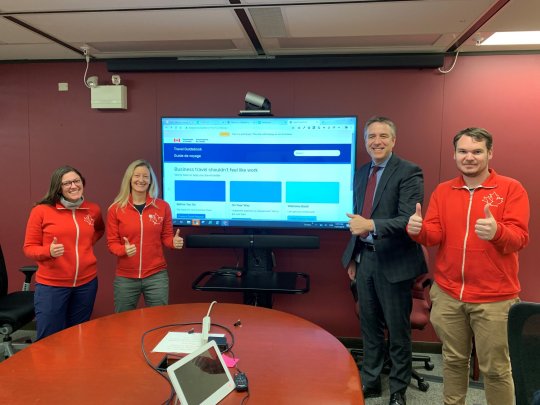
We had the opportunity to visit the Associate Deputy Minister Michael Vandergrift to talk about the future of GC Travel and show him some of our experiments. He also broke in his new @DMA_PSPC twitter account by tweeting about the meeting.

I was heads down coding the Travel Estimator, a prototype idea we’ve had kicking around for a while now. The estimator helps you plan your budget by pre-populating meals and per-diems, city rate limits and other accommodation allowances. Developing this prototype actually meant updating an API experiment we’d created as well.
Next week, we’re testing with users!

1 note
·
View note
Text
Week 20: Learn& Test& Build& Repeat
Nov 4-8, 2019
Monday
The team was a bit slow to reconvene on Monday after a weekend together at CANUX. We did a NextGENTravel team-wide retrospective on last week’s Design Sprint.
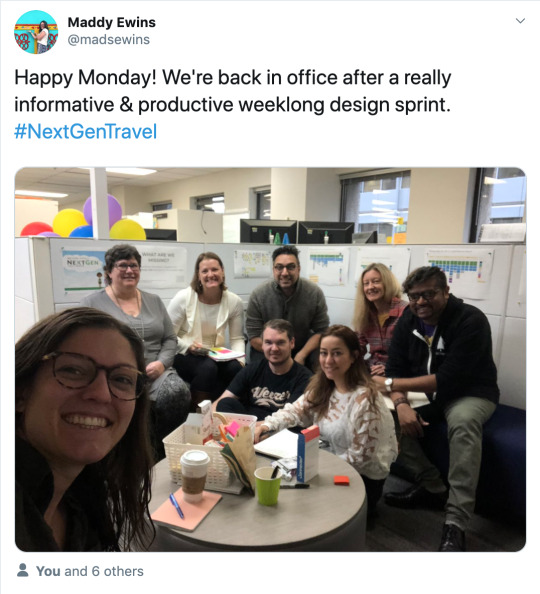
Keep reading
3 notes
·
View notes
